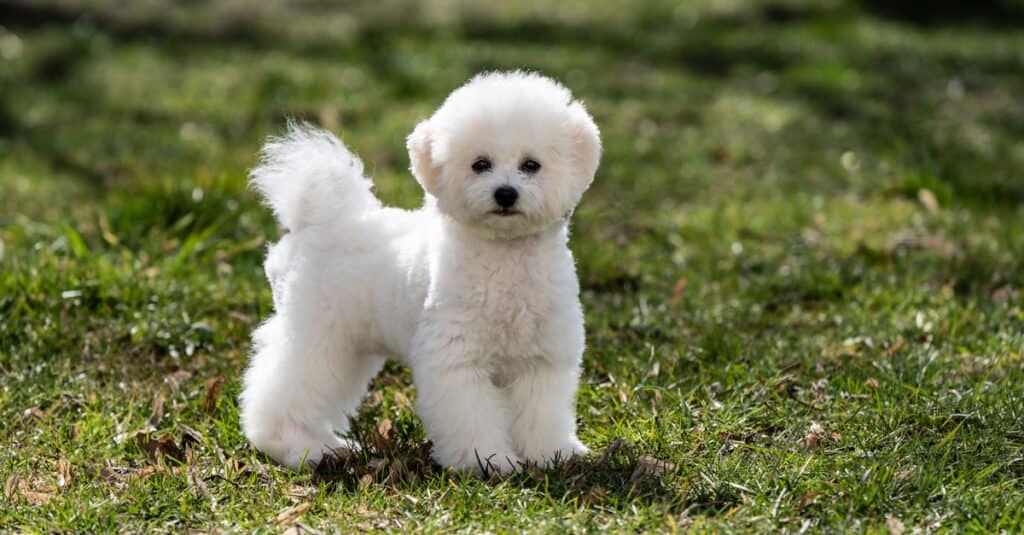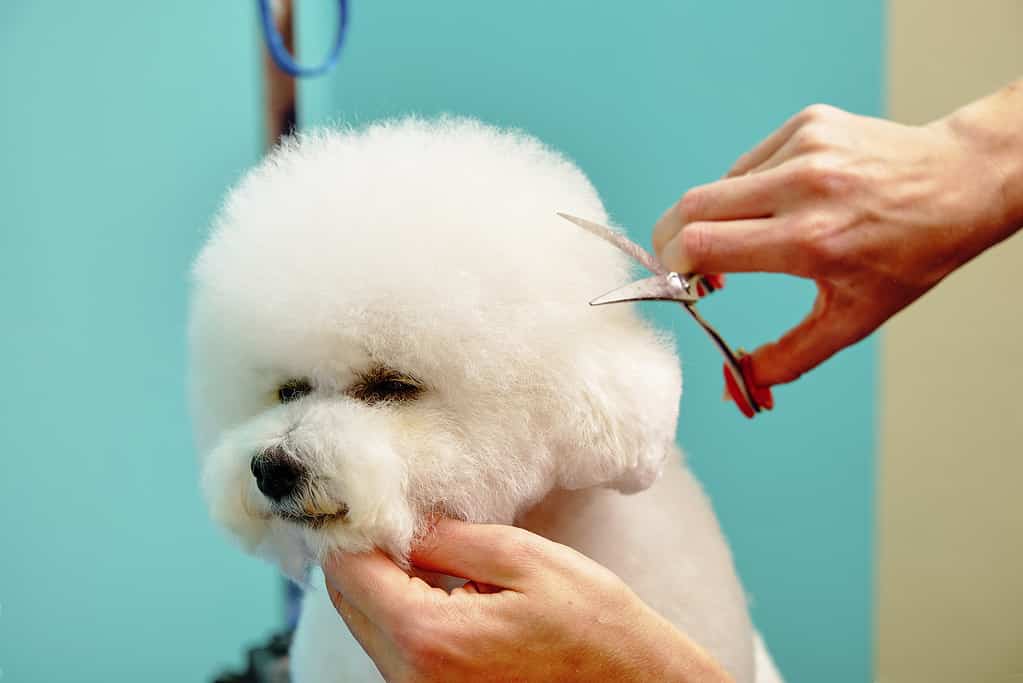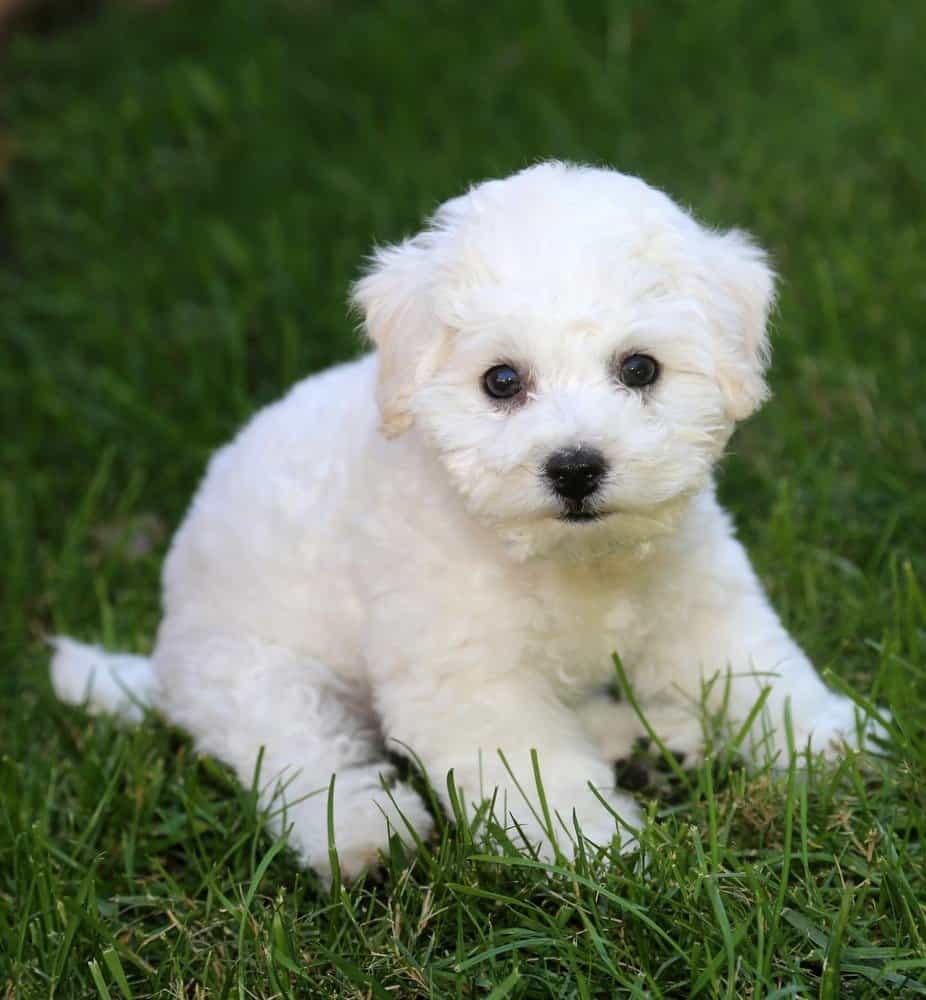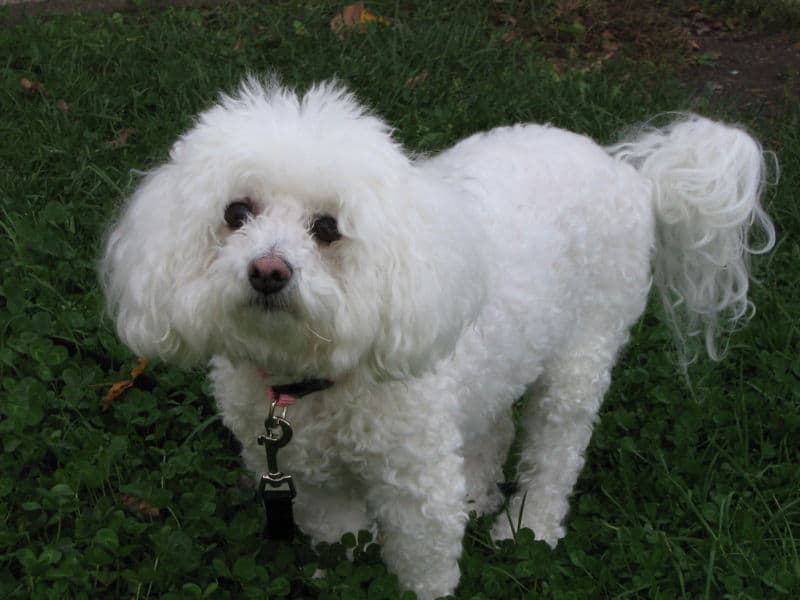In this article, we will be exploring the question of whether Bichon Frises are hypoallergenic. As many pet lovers already know, allergies can make it difficult to enjoy spending time with our furry companions. However, some dog breeds have gained a reputation for being less likely to cause allergic reactions in their owners. The Bichon Frise is one such breed that is often touted as hypoallergenic due to its fluffy coat and minimal shedding tendencies. But is there any truth to this claim? We will delve into this topic, specifically focusing on the Bichon Frise breed. So if you’re considering bringing home a new pet but suffer from allergies, read on to learn more about whether a Bichon Frise might be right for you!
About Bichon Frise

Bichon Frise has a dense, curly coat that is hypoallergenic.
©iStock.com/SStajic
The Bichon Frise has captivated the hearts of dog lovers all over the world. This delightful breed is small in size but big in personality and character. Their charming looks and intelligence have made them a popular choice for families for centuries.
Bichons stand around one foot tall with a distinctive white coat that is fluffy and soft to the touch. Their round head hair frames their large adorable eyes, while their dark lips and nose add an extra touch of cuteness. It’s no surprise that this breed is often used as models for advertisements or television commercials!
Despite their cute appearance, Bichon Frises are not just lap dogs. They have strong willpower and determination that makes them excellent watchdogs. They are also known to be friendly towards other dogs and children alike.
One of the most appealing aspects of this breed is its adaptability. They thrive both in city apartments or country homes, making them perfect pets for any living situation. Additionally, training these pups is usually straightforward due to their quick intelligence.
Perhaps what makes Bichon Frises so special, though, is their upbeat personalities. They seem to radiate joy wherever they go! Whether out on walks or cuddling up at home with family members, these little companions bring nothing but happiness into people’s lives.
Are Bichon Frise Hypoallergenic?

This soft dog breed, the Bichon Frise, is a great choice for someone with allergies.
©Ieva Tvaronavicute/Shutterstock.com
Yes, Bichon Frisse are hypoallergenic. For individuals who suffer from allergies, finding a pet that won’t trigger their symptoms can be challenging. Fortunately, the Bichon Frise breed is known for producing little dander – the tiny particles of skin that can cause allergic reactions in some people. This characteristic makes Bichon Frises a popular choice among allergy sufferers looking to add a furry companion to their home.
While no dog breed is 100% hypoallergenic, the low-dander nature of Bichon Frises means they are less likely to cause sneezing, itching, and other allergy-related discomforts. This trait stems from their curly coats, which trap dead skin cells and prevent them from circulating in the air as easily as they would with breeds with straight hair.
However, it’s important to note that while Bichon Frises may not trigger allergies as severely as other dogs might, individual sensitivities vary, and some people may still have an allergic reaction despite this breed’s low-dander coat. As such, potential owners should spend time with multiple dogs before deciding on adopting one to ensure they don’t experience any adverse reactions.
Overall, if you’re considering adding a canine companion into your life but worry about allergies getting in the way – consider exploring the option of owning a Bichon Frise!
Health
Bichon Frise dogs are known to be generally healthy, but it’s important to ensure that the breeder you choose is responsible and has screened their breeding stock for potential health conditions. Some of these conditions include allergies, bladder infections, luxating patella (a condition where the kneecap moves out of its normal position), cataracts, and other eye diseases.
One aspect of Bichon Frise’s dog health that can often be overlooked is dental care. If teeth brushing and regular dental check-ups aren’t made a priority, these dogs may experience early tooth loss or complications from gum infection. It’s important to make sure your Bichon receives proper dental care so they can maintain good oral health throughout their life.
In addition to dental care, regular ear cleaning is also recommended for Bichons in order to avoid ear infections. These dogs have floppy ears, which can trap moisture and debris inside if not properly cleaned on a consistent basis. By making sure your furry friend gets routine ear cleanings as part of their overall grooming regimen, you’ll help prevent any potential issues down the line.
Overall, if you stay diligent about keeping up with your Bichon’s healthcare needs, including screenings for common ailments as well as regular tooth brushing and ear cleaning, then you’re setting them up for a happy and healthy life by your side!
Grooming

Bichon frisé benefits from regular grooming.
©iStock.com/Ihar Halavach
If you are considering getting a Bichon Frise, it’s important to know that they require regular grooming to keep their coat in good condition. Brushing your Bichon at least two or three times a week is essential, but ideally, daily brushing is recommended. This will help prevent mats and tangles from forming in their curly fur.
In addition to regular brushing, your Bichon will need a bath and clipping at least once a month. While owners who show their dogs may learn how to do this themselves, most pet owners opt for taking their Bichons to the groomer every four to six weeks.
One of the reasons why the Bichon Frise is considered hypoallergenic is because they shed very little hair. However, it’s important to note that even though they don’t shed much hair on their own, you’ll still need to brush them regularly so that any loose hairs can be removed before they create mats in the undercoat.
Lastly, like all breeds of dogs, regardless of whether or not they’re hypoallergenic, keeping up with nail care by trimming them regularly should also be part of your routine pet care regimen for your beloved furry friend.
Exercise
When it comes to exercise, the Bichon Frise is often classified as “somewhat active,” which means that they do require a certain amount of physical activity to stay healthy and happy. However, it’s important to remember that this is just an average – some individual Bichons may be more or less active than others.
In general, Bichons are known for having long stretches of calm interspersed with brief bursts of high activity. They might spend most of the day lounging around the house or sleeping on their owner’s lap, only to suddenly take off running through the house or around the yard in a fit of energy. These sudden bouts of activity are sometimes called “zoomies” and can be quite entertaining to watch.
To keep your Bichon healthy and prevent boredom, daily play sessions, in addition to regular walks, are recommended. While another dog can be a great companion for exercise purposes, it’s still important for owners to spend quality playtime with their Bichon as well.
If you have access to a fenced-in backyard, this can provide an excellent opportunity for your pup to run around and burn off energy while staying safe from cars and other hazards outside. However, it’s worth noting that even though they may seem small and fluffy, Bichons are surprisingly fast runners. So if one makes a break for freedom outside the safety of your fence, they may be difficult (or even impossible) to catch!
Bichons are great candidates for agility or rally-type competitions, as they provide both mental and physical stimulation.
Training

Bichon Frise are highly trainable and intelligent dogs.
©mikeledray/Shutterstock.com
Bichon Frises are a highly trainable breed, making them a popular choice for those looking for an obedient and well-behaved companion. However, it is important to note that early socialization and puppy training classes are recommended for all breeds, including Bichons. This will help your furry friend develop proper behavior around strangers, other animals, and in different settings.
One of the biggest challenges with Bichon Frises is housebreaking. They have a reputation for being difficult to train in this area, but with patience and consistency, they can be successful. It is recommended to use positive reinforcement training methods when teaching your Bichon new behaviors or tricks, as they respond very well to rewards.
These dogs love performing tricks and learning new ones quickly, so incorporating fun training sessions into their routine can help keep them mentally stimulated and prevent boredom-related destructive behaviors at home. When left alone for long periods of time regularly without company or stimulation from family members, undesirable behaviors such as barking excessively or chewing on furniture may occur.
Overall, if you’re willing to invest time into properly socializing your Bichon Frise while also offering consistent positive reinforcement-based training techniques, it’s likely that you’ll end up with an obedient pet who loves nothing more than spending time by your side!
Nutrition
When it comes to feeding your Bichon Frise, quality is key. Whether you opt for commercially manufactured dog food or choose to prepare meals at home with the guidance of your veterinarian, it’s important that the diet you provide is appropriate for your furry friend’s age and nutritional needs.
Just like humans, some dogs are prone to putting on weight more easily than others. To ensure that your Bichon Frise maintains a healthy weight, be mindful of their calorie consumption and keep an eye on their weight level over time. While treats can be an effective tool in training and rewarding good behavior, it’s important not to go overboard, as too many treats can lead to obesity.
It’s also worth educating yourself on which human foods are safe for dogs and which should be avoided altogether. Many common household items, such as chocolate or grapes, can pose serious health risks if ingested by pets.
If you have any concerns about your Bichon Frise’s weight or dietary habits, don’t hesitate to consult with your vet for advice tailored specifically to your dog’s individual needs.
Lastly, make sure that clean and fresh water is always available for your furry friend throughout the day so they stay properly hydrated, especially during hot weather or periods of increased activity. By prioritizing balanced nutrition and proper hydration practices, you’ll help ensure that your beloved Bichon Frise stays happy and healthy through all stages of life.
History of the Bichon Frise

Bichon Frise dogs used to be street and circus performers during the French Revolution.
©Editor at Large, CC BY-SA 2.5, via Wikimedia Commons – License
The Bichon Frise is one of many small white dog breeds that belong to the Barbichon family, which includes the Maltese, Bolognese, and Havanese. It is believed that these breeds originated in Tenerife, the largest of the Canary Islands. They became so popular with sailors from the island that they were called Bichon Tenerife, which is now the primary ancestor of the modern Bichon Frise. During the 13th century, these dogs became favorites among European royalty and became especially popular during the Renaissance.
The Bichon Frise breed experienced a drastic change in their situation during the French Revolution when their aristocratic owners were imprisoned and executed. This left them out on the streets, where street performers took them in and trained them to perform tricks to make money. The Bichon’s energetic and lovable personality made them perfect for show business.
In the early 1900s, Bichons faced a difficult future due to the scarcity and economic hardships of the two World Wars. Fortunately, some devoted fans of the breed managed to rescue Bichons from the streets of France and Belgium, ensuring its survival. The breed was officially recognized in 1933 by the Societé Centrale Canine as the Bichon a Poil Frisé, translated as “Bichon of the curly hair.” In 1964, the Bichon Frise Club of America was founded in San Diego, and in 1971 the American Kennel Club placed it in the Miscellaneous Class. A year later, it was fully accepted into the Non-Sporting Group.
The photo featured at the top of this post is © Akaporn Bhothisuwan, CC BY 2.0, via Wikimedia Commons – License / Original
Ready to discover the top 10 cutest dog breeds in the entire world?
How about the fastest dogs, the largest dogs and those that are -- quite frankly -- just the kindest dogs on the planet? Each day, AZ Animals sends out lists just like this to our thousands of email subscribers. And the best part? It's FREE. Join today by entering your email below.
Thank you for reading! Have some feedback for us? Contact the AZ Animals editorial team.






